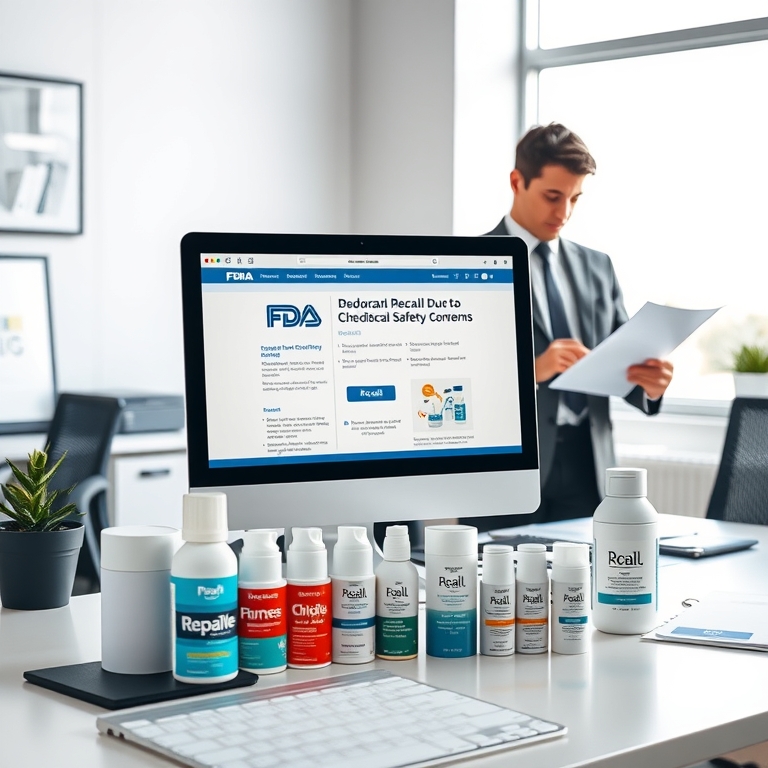In a significant move that underscores the ongoing vigilance of regulatory bodies in safeguarding consumer health, the U.S. Food and Drug Administration (FDA) has announced a recall of several popular deodorant brands due to concerns over potentially harmful chemical risks. This decision comes as part of an extensive investigation into personal care products, highlighting the delicate balance manufacturers must maintain between product efficacy and consumer safety.
The recall follows a series of tests and analyses conducted by the FDA, which identified the presence of benzene, a chemical compound classified as a human carcinogen, in some deodorant formulations. Benzene is a well-known industrial chemical used in the production of various products, but its presence in consumer goods, particularly those applied directly to the skin, raises significant health concerns. Exposure to benzene has been linked to an increased risk of leukemia and other blood disorders, prompting the FDA to take assertive action.
The brands affected by this recall are household names, widely recognized and trusted by consumers for their effectiveness in combating body odor. This recall serves as a reminder of the complexities involved in manufacturing personal care products, where the pursuit of innovation and effectiveness must always be balanced against the imperative of ensuring safety. For the companies involved, this situation represents not only a logistical and financial challenge but also a potential reputational risk that could affect consumer trust and brand loyalty.
The FDA’s decision to recall these products was not made lightly. It is based on robust scientific evidence and aligns with the agency’s mandate to protect public health. The FDA’s regulatory framework emphasizes the importance of preemptive action in cases where scientific evidence suggests a potential risk to consumers. In this instance, the presence of benzene, even in trace amounts, was deemed unacceptable given its classification as a carcinogen.
For consumers, the recall brings to light the often unseen complexities of the personal care industry. While deodorants are a staple in many people’s daily hygiene routines, the science behind their formulation is intricate. Manufacturers must carefully select ingredients that not only neutralize odors effectively but also adhere to stringent safety standards. This recall is a stark reminder that even widely used and trusted products must be subject to continuous scrutiny.
In response to the recall, the affected companies have pledged full cooperation with the FDA and have initiated their own investigations to determine the source of contamination. These companies are also working closely with suppliers and third-party testing facilities to ensure that their products meet all safety requirements before returning to the market. Transparency and communication with consumers have been prioritized, with many brands offering refunds or exchanges for recalled products.
The deodorant recall also has broader implications for the personal care industry as a whole. It underscores the necessity for companies to invest in rigorous quality control measures and to maintain a proactive approach to safety testing. The incident may prompt manufacturers to re-evaluate their sourcing and production processes, ensuring that all components of their products are free from harmful contaminants. Furthermore, this situation highlights the importance of regulatory oversight in maintaining consumer safety and trust.
In the wake of the recall, industry experts anticipate that there may be increased scrutiny on other personal care products, as regulators and consumers alike become more vigilant about potential safety risks. This could lead to a shift in industry standards, with a greater emphasis on transparency and the use of safer alternatives to potentially harmful chemicals. The recall may also spur innovation, as companies seek to develop new formulations that are both effective and safe.
For consumers, the recall serves as a call to action to stay informed about the products they use daily. While manufacturers and regulatory bodies work diligently to ensure product safety, consumers can also play a role by reading labels, understanding ingredient lists, and staying updated on safety recalls and alerts. Awareness and education are key components in ensuring personal safety and making informed choices about personal care products.
In conclusion, the FDA’s recall of several deodorant brands over potentially harmful chemical risks marks a pivotal moment for the personal care industry. It serves as a reminder of the critical importance of safety in product formulation and the ongoing need for vigilance and transparency. As the affected companies work to address the issue and restore consumer confidence, the incident may well lead to broader changes in industry practices and standards, ultimately benefiting consumers through enhanced safety and innovation.

Leave a Reply